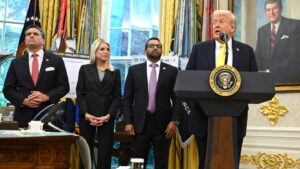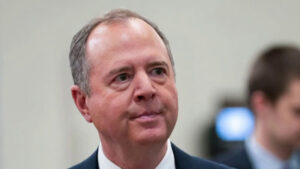Congress
Vulnerable House Republicans press Johnson on Obamacare subsidies
Thirteen vulnerable Republicans are urging Speaker Mike Johnson to “immediately turn our focus” to extending Obamacare subsidies after the government reopens.
The group, led by GOP Reps. Jen Kiggans of Virginia and Jeff Van Drew of New Jersey, laid out its case Tuesday in a new letter to Johnson, reminding him that millions of Americans face skyrocketing health insurance premiums as a result of the expiration of the subsidies at the end of the year.
While the moderate members acknowledge Republicans must not cede to Democratic demands that the subsidies be extended during the shutdown, they also emphasize that Johnson must help the party “chart a conservative path” forward on the credits immediately after the shutdown ends.
“Allowing these tax credits to lapse without a clear path forward would risk real harm to those we represent,” wrote the lawmakers. “Our Conference and President Trump have been clear that we will not take healthcare away from families who depend on it.”
Conversations have already started around pairing an extension of the enhanced Affordable Care Act tax credits with conservative health care policy priorities. There are discussions about making changes to the structure of the tax credits themselves, for instance instituting new minimum out-of-pocket premiums for all enrollees and imposing an income cap for eligibility.
House GOP leaders are engaged in early, informal conversations with White House officials about potential changes, too. Still, many hard-liners remain dug in against any extension, which Republicans across the political spectrum caution would be a political mistake heading into the midterms.
The Republicans said in their letter that they agree with their conservative colleagues that changes are needed: “Let us be clear: significant reforms are needed to make these credits more fiscally responsible and ensure they are going to the Americans who need them most.”
But with no resolution in sight to the 21-day government funding standoff between the two parties, the letter signals mounting GOP anxiety about the issue as Nov. 1 fast approaches. That’s the date for open enrollment in plans under the Affordable Care Act, at which point it might be too late to avoid massive premium hikes.
State insurance officials have warned that an expectation that the enhanced tax credits will expire has already been baked into updated insurance rates, and it will be difficult to update those rates if Congress passes an extension in November or December.
Kiggans introduced a bill in September that would extend the subsidies for a year, which currently has the support of 28 co-sponsors, equally divided between the two parties. Twelve of the signers of the Johnson letter are supporters of the Kiggans measure.
Congress
Senators eye sanctions vote after Trump targets Russian oil
The bipartisan authors of sweeping Russia sanctions legislation are hoping the Senate is finally ready to consider their bill after President Donald Trump hit Moscow’s energy sector with penalties this week.
Sen. Lindsey Graham (R-S.C.), a close Trump ally and coauthor of legislation taking aim at Russian oil and gas revenue, said Congress “should continue the pressure.” He said the Senate could schedule a “Russia week” in which it takes up several bills related to Moscow’s war against Ukraine.
Graham and Sen. Richard Blumenthal (D-Conn.) have been pressing for months for a vote on their measure to implement steep tariffs on countries that import Russian energy and secondary sanctions on foreign companies that aid in its energy production.
“We have the ability to create a sanction regime that would be beyond legal challenge,” Graham told reporters, explaining why congressional action would be prudent beyond Trump’s unilateral moves. He added that “Trump would be the quarterback.”
Majority Leader John Thune said last week he was ready to advance the long-stalled sanctions package, predicting last week the bill will be brought up within a month. But he struck a more cautious note Thursday.
“As you know, I’ve been interested for some time in getting the sanctions bill up on the floor,” he said. “We’re trying to do … that in concert and coordination with the White House to make sure that we’re giving them the best possible opportunity to succeed in getting Russia to the table.”
Separately, Sen. Jim Risch (R-Idaho), chair of the Senate Foreign Relations Committee, called a potential vote on sanctions “a work in progress” Thursday.
Thune and Graham have worked with the White House to smooth over technical issues in the bill, but progress halted last week after Trump spoke to Russian President Vladimir Putin and announced plans for a summit meeting in Hungary.
Those plans have since collapsed, prompting the Treasury Department to sanction Russia’s two largest oil companies Wednesday. Now, advocates for a tougher line against Putin want the Senate to follow up with the Graham-Blumenthal bill, which has more than 80 cosponsors.
“I think it establishes a trajectory for passing our sanctions bill, and there’s no excuse for delay,” Blumenthal said.
Asked if Trump supports the sanctions bill, Thune said as a “general matter, yes,” but added there were things the White House wants incorporated and that “we’re in conversation with them.”
Graham and Blumenthal floated the possibility that other bills could come to the floor, including measures allowing frozen Russian assets to be repurposed for Ukraine’s use and designating Russia as a state sponsor of terrorism. Thune said discussions are underway about votes on those bills.
Minority Leader Chuck Schumer, meanwhile, said off the floor Thursday that the Senate should advance “a strong, tough sanctions bill.”
Calen Razor contributed to this report.
Congress
Obamacare ‘auto-enrollees’ are key target as Republicans formulate tax-credit extension plan
As Republicans formulate a plan to potentially extend key health insurance subsidies that are at the center of the government shutdown fight, House Energy and Commerce Chair Brett Guthrie warned in an interview Tuesday that any extension would “absolutely” need to include a crackdown on so-called “phantom” Obamacare enrollees.
The move is sure to spark a clash with Democrats, who successfully challenged similar provisions from Guthrie’s committees when they were included in the GOP megabill that passed over the summer. But now Republicans have more leverage as Democrats push for the continuation of tax credits that are set to expire Dec. 31.
“If there’s going to be an extension of those tax credits, the program integrity stuff … absolutely needs to be in place,” Guthrie said.
He was referencing a suite of Republican policies that would put new curbs on reenrollment for the enhanced insurance subsidies that are at the core of Democrats’ shutdown demands. Republicans and influential conservative health lobbyists complain the status quo leads to waste, fraud and abuse.
“Once you sign up, you’re on it forever,” Guthrie said.
Democrats argue those complaints aren’t grounded in reality, and the GOP push could set off a larger fight over how Americans enrolled in the program. Many Democrats, especially progressives, are worried about adding new barriers to access coverage, which they argue would disproportionately hit low-income Americans.
When Republicans tried to insert new curbs in their party-line megabill, Senate Democrats successfully challenged the provisions with the chamber’s parliamentarian.
Now House and Senate GOP leaders are making a big push for a crackdown on auto-enrollment as they begin talks among themselves and with White House officials about a possible subsidy extension and other conservative health care policy initiatives.
Senate Majority Leader John Thune in particular frequently references phantom enrollment as one problem Republicans want to tackle. At least some Democrats are open to negotiating on the topic, and there have been quiet, informal conversations in the Senate about that piece specifically.
“I understand what their issue is,” Sen. Mark Kelly (D-Ariz.) said in an interview Thursday. “And if they would work with us and have a real negotiation on how we fix the premiums, I think that is something that we could address.”
Kelly confirmed he’s talked to “several” Republican colleagues about the policy, adding, “I think they have some points.” The other “other side” of the argument, he said, is that “folks that don’t have a lot of means, when you put barriers in front of them, they tend to drop their health insurance.”
Robert King contributed to this report.
Congress
101 Republicans to defend community finance program from Trump cuts
More than 100 Republican lawmakers are expected to sign on to a letter pushing back on the Trump administration’s move to eliminate a popular, bipartisan community development finance fund that helps small businesses and home buyers access capital in areas of the country underserved by big banks.
The congressional Republicans are pressing the Trump administration to reverse its decision to fire all employees at the Treasury Department’s Community Development Financial Institutions Fund, according to the draft letter. The letter is expected to be sent to the administration Thursday.
The bicameral letter, led by Rep. Young Kim (R-Calif.), a member of the House Financial Services Committee, and Sen. Mike Crapo (R-Idaho), who chairs the Senate’s Community Development Finance Caucus, is addressed to Treasury Secretary Scott Bessent and Office of Management Director Russ Vought. The letter “strongly urge[s] the Administration to continue carrying out the statutory obligations of the CDFI Fund that are essential to ensuring private investments reach our states and districts.”
The large wave of GOP lawmakers that signed the letter signals widespread support among congressional Republicans for a program that the Trump administration has attempted to eviscerate.
The list of signatories obtained by Blue Light News includes 27 Senators and 74 House members. The letter was signed by key Republicans, including Sens. Tim Scott (R-S.C), Lisa Murkowski (R-Alaska), Susan Collins (R-Maine), Thom Tillis (R-N.C.), Chuck Grassley (R-Iowa), Mike Rounds (R-S.D.) and Reps. Bill Huizenga (R-Mich.), Mike Lawler (R-N.Y.) Mike Flood (R-Neb.), and Andrew Garbarino (R-N.Y.), among others.
The CDFI Fund awards federal dollars to CDFIs, which are community banks, credit unions and other financial institutions, that lend and provide other types of capital as part of a public-private partnership designed to increase the accessibility for communities traditionally underserved by the banking industry.
-
Uncategorized12 months ago
Bob Good to step down as Freedom Caucus chair this week
-

 Politics8 months ago
Politics8 months agoFormer ‘Squad’ members launching ‘Bowman and Bush’ YouTube show
-

 The Josh Fourrier Show12 months ago
The Josh Fourrier Show12 months agoDOOMSDAY: Trump won, now what?
-

 The Dictatorship8 months ago
The Dictatorship8 months agoPete Hegseth’s tenure at the Pentagon goes from bad to worse
-

 Politics8 months ago
Politics8 months agoBlue Light News’s Editorial Director Ryan Hutchins speaks at Blue Light News’s 2025 Governors Summit
-

 The Dictatorship8 months ago
The Dictatorship8 months agoLuigi Mangione acknowledges public support in first official statement since arrest
-

 Politics12 months ago
Politics12 months agoWhat 7 political experts will be watching at Tuesday’s debate
-

 Politics8 months ago
Politics8 months agoFormer Kentucky AG Daniel Cameron launches Senate bid




